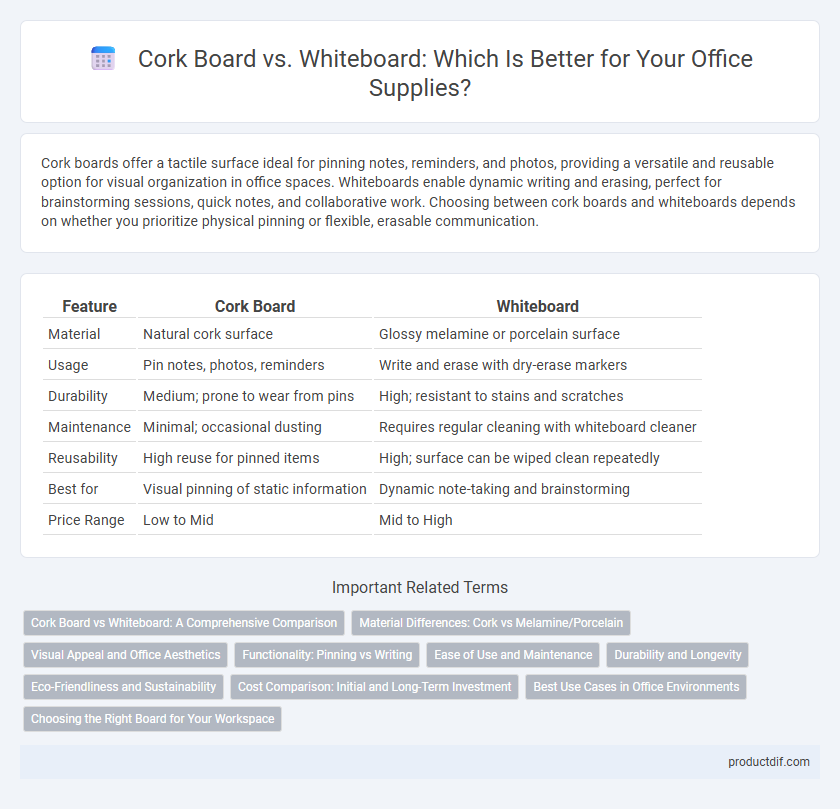Cork boards offer a tactile surface ideal for pinning notes, reminders, and photos, providing a versatile and reusable option for visual organization in office spaces. Whiteboards enable dynamic writing and erasing, perfect for brainstorming sessions, quick notes, and collaborative work. Choosing between cork boards and whiteboards depends on whether you prioritize physical pinning or flexible, erasable communication.
Table of Comparison
| Feature | Cork Board | Whiteboard |
|---|---|---|
| Material | Natural cork surface | Glossy melamine or porcelain surface |
| Usage | Pin notes, photos, reminders | Write and erase with dry-erase markers |
| Durability | Medium; prone to wear from pins | High; resistant to stains and scratches |
| Maintenance | Minimal; occasional dusting | Requires regular cleaning with whiteboard cleaner |
| Reusability | High reuse for pinned items | High; surface can be wiped clean repeatedly |
| Best for | Visual pinning of static information | Dynamic note-taking and brainstorming |
| Price Range | Low to Mid | Mid to High |
Cork Board vs Whiteboard: A Comprehensive Comparison
Cork boards provide a natural, pin-friendly surface ideal for organizing physical documents, photos, and notes with push pins, promoting tactile interaction and visual reminders. Whiteboards offer a smooth, erasable surface suited for dynamic brainstorming, presentations, and collaboration, enabling quick note changes and color-coded markers for emphasis. Choosing between cork boards and whiteboards depends on the need for permanent displays versus flexible, real-time updates in office environments.
Material Differences: Cork vs Melamine/Porcelain
Cork boards feature a natural, porous surface made from harvested cork bark, providing excellent pin-holding capability and a warm, textured aesthetic ideal for bulletin displays. Whiteboards, commonly constructed from melamine or porcelain, offer a smooth, non-porous surface designed for dry-erase markers, with porcelain variants delivering superior durability, stain resistance, and a long-lasting writing surface. The choice between cork and melamine/porcelain hinges on the intended use: cork excels in pinning documents and notices, while whiteboards facilitate dynamic writing and erasing functions in office environments.
Visual Appeal and Office Aesthetics
Cork boards offer a natural, warm texture that enhances office aesthetics with an organic, tactile visual appeal perfect for creative spaces. Whiteboards provide a sleek, modern look with a clean, minimalist surface that complements contemporary office designs and promotes a professional atmosphere. Choosing between cork boards and whiteboards depends on desired office ambiance--rustic and inviting versus polished and efficient.
Functionality: Pinning vs Writing
Cork boards excel in functionality by allowing users to pin notes, photos, and reminders securely with push pins or thumbtacks. Whiteboards offer a versatile writing surface ideal for brainstorming, scheduling, and collaborative work with dry-erase markers. Choosing between cork boards and whiteboards depends on the need for static display versus dynamic, erasable content in office environments.
Ease of Use and Maintenance
Cork boards offer easy pinning and visual organization with minimal maintenance, requiring occasional dusting and pin replacement. Whiteboards provide smooth writing and quick erasing but demand regular cleaning with appropriate solvents to prevent ghosting and marker stains. Both boards serve distinct office needs, balancing simplicity against upkeep based on usage frequency and presentation style.
Durability and Longevity
Cork boards offer exceptional durability with a natural resistance to wear from pin use, maintaining functionality over years without surface damage. Whiteboards, while versatile for frequent writing and erasing, are prone to ghosting and surface scratches that can reduce lifespan unless high-quality materials like porcelain are used. Choosing between them depends on long-term usage needs, with cork boards ideal for consistent pinning and whiteboards suited for dynamic, reusable writing tasks.
Eco-Friendliness and Sustainability
Cork boards are highly eco-friendly due to their natural, renewable cork material harvested from cork oak trees without harming them, making them a sustainable choice for office supplies. Whiteboards, often made from non-recyclable materials like melamine or aluminum with limited recyclability, have a higher environmental impact during production and disposal. Choosing cork boards supports sustainability goals by utilizing biodegradable components and promoting a circular economy in office environments.
Cost Comparison: Initial and Long-Term Investment
Cork boards typically have a lower initial cost, ranging from $10 to $30, compared to whiteboards, which can cost between $20 and $100 depending on size and quality. Over time, cork boards require minimal maintenance and replacement of pins, leading to lower long-term expenses, whereas whiteboards may need regular cleaning solutions and eventual resurfacing or replacement, increasing total cost. Businesses prioritizing budget-friendly, low-maintenance options often find cork boards more cost-effective, while whiteboards offer multifunctional features that justify higher investment for frequent use.
Best Use Cases in Office Environments
Cork boards excel in displaying pinned documents, notes, and reminders, making them ideal for collaborative workspaces where physical posting enhances team communication. Whiteboards offer dynamic interaction through easy writing, erasing, and drawing, suited for brainstorming sessions, project planning, and presentations. Offices benefit from using cork boards for static information and whiteboards for flexible, real-time idea sharing and problem-solving.
Choosing the Right Board for Your Workspace
Selecting the right board for your workspace depends on your specific needs: cork boards offer a tactile surface ideal for pinning notes, photos, and reminders, promoting a dynamic, visual organization style. Whiteboards provide a smooth, erasable surface perfect for brainstorming sessions, quick notes, and collaborative work, enhancing flexibility and reusability. Consider factors like workspace size, frequency of updates, and preferred interaction style to determine whether a cork board or whiteboard maximizes productivity and communication efficiency.
Cork Board vs Whiteboard Infographic

 productdif.com
productdif.com